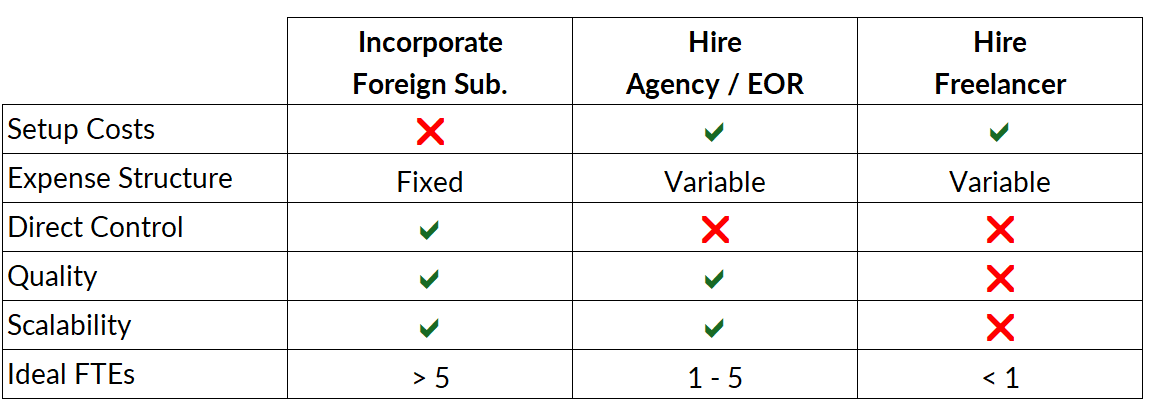
Small Business | Strategy
Cost Management: Three Ways to Nearshore Labor
October 3, 2024
As the US trade war with China enters its 7th year, hundreds of businesses are looking to nearshore labor as a growth solution.
Nearshoring is an attractive strategy for businesses looking to optimize costs while maintaining quality. Hiring in low-cost countries near the United States offers the expense reduction of offshoring with fewer logistical challenges from time zones and cultural differences. If responsiveness, collaboration, and cost are important in your business processes, nearshoring has many advantages over offshoring or hiring W2 employees.
You may feel intimidated by the complexities of using nearshore labor. How will you manage data security risks? How can you ensure they stay on task? Who will supervise your team?
Choosing the proper structure for hiring nearshore labor can be challenging. This article examines three common methods:
Incorporating an Entity in a Foreign Country and Hiring Employees Directly
Partnering with an Agency That Manages Nearshore Teams
Hiring Freelancers on a Contractor Basis Through Platforms Like Upwork or Fiverr
We’ll explore each option’s advantages, costs, risks, and best use cases to help you determine the most suitable approach for your business.
Incorporating an Entity in a Foreign Country
The most advanced form of nearshoring involves incorporating a subsidiary in a foreign country. This approach offers the greatest amount of control and economies of scale.
Advantages
Full Control Over Operations: Establishing a legal entity allows you to manage employees directly, set organizational policies, and create a cohesive company culture.
Best Economies of Scale: This approach has the lowest cost at a size beyond five employees.
Access to Local Talent Pools: Direct hiring allows you to directly tap into local talent markets and build a loyal, high-quality team.
Costs
Expensive Setup and Overhead Costs: Establishing a foreign entity involves significant initial expenses, including legal fees, registration fees, and consulting fees. Additionally, you must budget for ongoing compliance and administration.
Other Operational Expenses: Regular expenses include office space, employee benefits, payroll taxes, and other overhead costs for running a local office.
Risks
Legal and Regulatory Complexity: Each country has unique employment, taxation, and business operations laws. Navigating these regulations without local expertise can lead to compliance issues and potential legal liabilities. You will likely need a local team of experienced administrators, attorneys, and accountants.
Management Challenges: Managing a foreign team can be complex, especially if your company lacks experience in the local business culture and practices. Miscommunications and cultural blunders often cause misunderstandings, underperformance, and inefficiency.
Best For
Foreign subsidiary incorporation is best for businesses seeking a sizable long-term presence in a specific country and willing to invest in building a local operation. It suits companies with significant resources who need complete operational control, such as large enterprises or rapidly growing companies looking to scale up.
Hire a Nearshore Agency
Rather than take on the overhead burden of a foreign subsidiary, you can contract an agency already present in that foreign country. The agency could be an Employer of Record who only handles regulatory work and taxes, or it could be a full-scale service agency that (like CFOshare) uses its nearshore presence to offer cost-competitive services.
Advantages
Easy: The agency handles hiring, payroll, compliance, and other HR-related functions, freeing you from complex administrative tasks.
Flexibility and Scalability: Agencies can quickly scale your team up or down based on your business needs, providing flexibility without the commitment of direct employment.
Low Admin Expense: Compared to setting up a subsidiary, hiring an agency can significantly reduce compliance and HR management expenses.
Low legal risk: the contract agency owns regulatory and legal risk, shielding your company from potentially expensive lawsuits and fines.
Reliable quality: reputable agencies have processes to ensure consistent talent and service quality.
Costs
Agencies charge service fees on top of employee salaries to cover administrative expenses and profits. If you employ fewer than 5 FTE, these fees will likely be cheaper than maintaining a foreign subsidiary.
Using the agency’s established entity, you also avoid the lengthy and expensive startup expenses. However, the agency’s fees may eclipse any one-time startup costs over time.
Risks
Less Direct Control: While agencies manage administrative tasks, they may not fully align with your company’s values and culture.
Dependence on the Agency: Your company’s success in the region depends on the agency’s ability to attract and retain quality talent. Any issues with the agency’s performance could impact your operations.
Best For
Contracting a nearshore agency is ideal for small to medium-sized businesses looking to quickly access moderate to high-quality nearshore talent. It is particularly suitable for companies needing to scale operations cost-effectively, such as startups or those with project-based needs.
3. Hiring Freelancers on a Contractor Basis
The fastest and simplest approach to using nearshore labor is to contract individuals through a marketplace like Upwork or Fiverr.
Advantages
Maximum Flexibility: Freelancers are hired on a project-by-project basis, making this option ideal for short-term projects or when specific expertise is required.
Cost-Effectiveness: Freelancers typically have lower hourly rates than full-time employees, especially in regions with lower living costs. You also avoid costs associated with benefits and payroll taxes.
Access to a Global Talent Pool: Platforms like Upwork and Fiverr provide access to a global talent pool rather than choosing one geography to concentrate.
Costs
Freelancer costs vary widely based on experience, skill set, and the complexity of the task. While generally lower than full-time employees, highly specialized freelancers can be expensive. Fees are generally per-project, but hourly work arrangements can also be set up.
Remember that the platform will also charge a service fee for connecting you to the contractor.
Risks
Inconsistent Quality: The quality of freelancers can vary, and finding the right fit may take time and effort. You risk hiring someone who doesn’t meet your expectations or deliver on time.
Limited Control and Engagement: As independent contractors, freelancers are not as integrated into your business processes and may not be as committed to your company’s goals like full-time employees.
Data security: depending on your contractor’s geography, you may have limited recourse for damage caused by data leaks or IP theft.
Best For
Contracting over Fiverr or Upwork is best for companies with short-term or ad hoc needs, such as small businesses or startups producing a single advertisement or setting up a SaaS product. It’s also a great choice for businesses that need to quickly fill gaps without long-term commitments, such as marketing agencies needing extra design support during peak seasons.
Which Nearshore Approach is Right for You?
Selecting the best strategy for hiring nearshore labor depends on your business objectives, budget, and risk tolerance:
Incorporate an Entity if you are committed to long-term expansion in a specific region and require full control over your operations.
Partner with an Agency if you want to quickly launch long-term and flexible engagements without administrative burden.
Hire Freelancers if you need low-cost, flexible, and specialized skills for short-term projects or fluctuating workloads.
Each method offers distinct advantages and challenges, and understanding them will help you make informed decisions and effectively leverage the benefits of nearshore talent.
Related Articles
Ready to Elevate Your Finances?
Need more specific advice? Schedule a consultation





